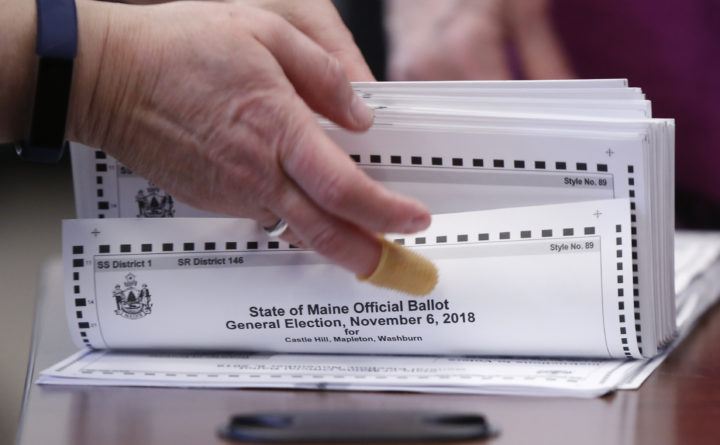
AUGUSTA, Maine —U.S. Rep. Bruce Poliquin and three supporters sued Maine’s secretary of state on Tuesday to stop a ranked-choice ballot count and declare him the winner in his re-election race against Assistant Maine House Majority Leader Jared Golden.
The 25-page complaint that Poliquin, a two-term Republican from Maine’s 2nd Congressional District, filed in U.S. District Court claims that the state’s ranked-choice voting system — enshrined by voters in 2016 — violates the U.S. Constitution and the Voting Rights Act of 1965.
The legal issues raised by Poliquin are untested in Maine, though the state’s high court has weighed in twice on the voting method. Last year, the Maine Supreme Judicial Court said the method ran afoul of the Maine Constitution as it pertained to statewide general elections, though it cleared the way for ranked-choice voting in the June primaries.
In a Tuesday letter, lawyers for Poliquin asked a spokeswoman for Secretary of State Matt Dunlap to stop the ranked-choice count that began Friday, but in a statement, Dunlap spokeswoman Kristen Muszynski said the count will continue and if Dunlap receives a court order to halt the process, “we will review it with our legal advisors.”
The race between Poliquin and Golden, a Democrat, went to a ranked-choice ballot count that began on Friday in Augusta after nobody won a majority of votes in the first round. The incumbent won 46.3 percent of votes to Golden’s 45.6 percent, according to unofficial results.
Dunlap, a Democrat, said the ranked-choice count could finish by Thursday. Poliquin showed up at an Augusta news conference on Tuesday to declare victory. He told reporters that he won “fair and square” under the old system and that the new system is “confusing.”
Golden is favored to win when Bond’s and Hoar’s votes are reallocated, according to an Election Day exit poll of 534 voters in the 2nd District conducted by the Bangor Daily News, FairVote and Colby College. The Democrat won a strong majority of Bond and Hoar voters in that survey.
Poliquin and Golden have large teams of lawyers in Maine and in Washington, D.C. Poliquin’s team includes Lee Goodman, a Republican who served on the Federal Election Commission from 2013 to 2018 and chaired it briefly during his tenure. Golden’s team includes Marc Elias, who was the top attorney for the 2016 presidential campaign of Democrat Hillary Clinton.
Poliquin and his three supporters say in the complaint that they seek to “protect their right to vote” and “vote effectively” in federal elections, arguing that Dunlap has violated the First and 14th Amendments of the U.S. Constitution — guaranteeing rights to free association and equal protection — by not declaring the Republican as the winner based on first-round results.
Golden’s motion to intervene in the lawsuit says certain voters who ranked choices would be “effectively disenfranchised” if Poliquin’s lawsuit succeeds. The case will be heard by U.S. District Court judge Lance Walker, who was confirmed by the U.S. Senate last month. Walker granted Poliquin’s request for a Wednesday morning hearing in Bangor on an order to halt the count.
Maine’s ranked-choice system has been in federal court only once before, when the Maine Republican Party made an effort to buck the method before the primaries. It argued that the method infringed on its free-association rights, but a federal judge tossed that suit in May.
Poliquin’s argument is similar to an argument made in 2011 against San Francisco’s use of ranked-choice voting that was thrown out by a federal appeals court, saying the complainant hadn’t proved that the method was unconstitutional. In a statement, Jill Ward, the president of the League of Women Voters of Maine, which helped lead the passage of ranked-choice voting here, said the group has “no doubt that the federal court will uphold the law.”
For a roundup of Maine political news, click here for the Daily Brief. Click here to get Maine’s only newsletter on state politics via email on weekday mornings.
This article originally appeared on www.bangordailynews.com.




